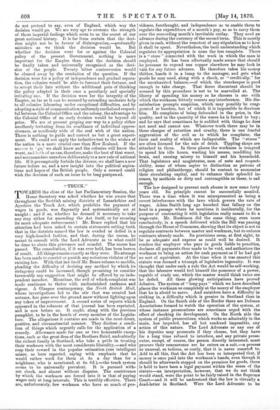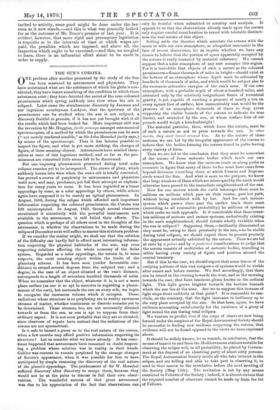"TRUCK."
TOWARDS the close of the last Parliamentary Session, the Home Secretary was asked whether he was aware that throughout the Scottish mining districts of Lanarkshire and Ayrshire the Truck Act, which prohibits the payment of wages in goods, was flagrantly and systematically set at naught ; and if so, whether he deemed it necessary to take any step either for amending the Act itself, or for securing its more adequate enforcement ? Mr. Bruce replied that his attention had been asked to certain statements setting forth that in the districts named the law is evaded or defied in a very high-handed fashion, and that, during the recess, he meant to consult with the Lord Advocate as to what could be done to abate this grievance and scandal. The recess has passed. The consultation, if it was ever held, has been barren of result. All things remain exactly as they were. No attempt has been made to convict or punish any notorious violator of the existing law. With that law itself Mr. Bruce refuses to meddle, pleading the difficulty of devising any method by which its stringency could be increased, though promising to consider favourably any suggestion that might be offered by an inde- pendent member. Meantime, the evil of which complaint was made continues to thrive with undiminished rankness and vigour. A Glasgow contemporary, the North British Mail, whose investigations led to the stir that was created last autumn, has gone over the ground anew without lighting upon any token of improvement. A second series of reports which appeared in the columns of that journal has been reprinted, and is now before us. It ought, along with the previous pamphlet, to be in the hands of every member of the Legisla- ture. The allegations it contains are made in the most direct, positive, and circumstantial manner. They disclose a condi- tion of things which urgently calls for the application of a remedy. Allowance made for one or two honourable excep- tions, such as the great firm of the Brothers Baird, undoubtedly the richest family in Scotland, who take a pride in treating their workmen with the most considerate liberality,—and who reap their reward in the popular estimation (one intelligent miner, as here reported, saying with emphasis that he would rather work for them at 4s. a day than for a neighbour, who is mentioned, at 4s. 6d.),—the truck system seems to be universally prevalent. It is pursued with- out check, and almost without disguise. The contrivance by which the workmen are forced into it is that of paying wages only at long intervals. This is terribly effective. 'There are, unfortunately, few workmen who have so much of pro- vidence, forethought, and independence as to enable them to regulate the expenditure of a month's pay, so as to carry them over the succeeding month's inevitable outlay. They need an advance during the currency of the second term. This is mostly given in cash, without the remotest of any stipulation as to how it shall be spent. Nevertheless, the tacit understanding which regulates its appropriation is none the less complete. There is a " store " connected with the work in which the man is employed. He has been effectually made aware that should he presume to expend one copper elsewhere he may look in vain for any future advance. He therefore takes his money thither, hands it in a lamp to the manager, and gets what goods he may need, along with a check, or "credit-slip," for the unexhausted balance,—of which the storekeeper is good enough to take charge. That fierce discontent should be aroused by this procedure is not to be marvelled at. The liberty of spending his money as he chooses is one with which the workman bitterly resents any interference. His dis- satisfaction prompts suspicion, which may possibly be exag- gerated or baseless, but of which it is impossible to disabuse him. He complains of being defrauded in the price, in the quality, and in the quantity of the wares he is forced to buy ; and he says that sometimes he is saddled with things he does not need and cannot use. Whatever truth there may be in these charges of extortion and cruelty, there is one fearful aggravation of the evil as to which he complains, the force and reality of which are indisputable. The " stores " are often licensed for the sale of drink. Tippling shops are attached to them. In these places the workman is tempted to spend his idle hours, wasting his means, muddling his brain, and causing misery to himself and his household. That legislators and magistrates, men of note and respect- ability, some of whom aspire to distinction as patrons of religion and philanthropy, should be content to economize their circulating capital, and to enhance their splendid in- comes, by methods so dirty and contemptible as these, is sad enough. The law designed to prevent such abuses is now some forty years old. Its principle cannot be successfully assailed. There was a time when it was misrepresented as being a covert interference with the laws which govern the rate of wages. Adam Smith long ago knocked that fallacy on the head in a passage where he mentions it incidentally, for the purpose of contrasting it with legislation really meant to fix a wage-rate. Mr. Huskisson did the same thing, even more conclusively, in a speech delivered while the Bill was passing through the House of Commons, showing that its object is not to regulate contracts between master and workman, but to enforce contracts already made. Its provisions seem, at first sight, to be as adequate and express as could well be desired. It renders the employer who pays in goods liable to penalties, declares all payments thus made to be void, and authorizes the workman to bring an action for cash payment as if he had got no sort of equivalent. At the time when it was enacted this statute was deemed a triumph of legislative ingenuity. It was thought that under such a rule the Act would be self-working, that the labourer would feel himself the possessor of a power, capable of ready use, which the master would think twice ere he defied. All these glowing anticipations have proved delusive. The system of "long pays" which we have described places the workman so completely at the mercy of the employer that he is afraid to move. And outsiders have a difficulty in striking in, a difficulty which is greater in Scotland than in England. On the South side of the Border there are Defence Associations formed to watch the operation of the system, at whose instance prosecutions are sometimes urged with the effect of checking its development. On the North side the system of public prosecutions, which works so admirably in the main, has impeded, has all but rendered impossible, any action of this nature. The Lord Advocate or any one of his deputies may prosecute if they choose, but they have for a long time refused to interfere, and any private prose- cutor, except, of course, the person directly interested, mast procure their concurrence ere he enters on a suit,—a process so unusual, so tedious, so costly, that it is never resorted to. Add to all this, that the Act has been so interpreted that, if money is once paid into the workman's hands, even though it should be afterwards stopped on the premises for goods, there is held to have been a legal payment within the sense of the statute—an interpretation, however, that we do not think would stand, were the point to be fairly raised in the Supreme Court—and it will be understood that the law is virtually a dead-letter in Scotland. Were the Lord Advocate to be incited to activity, some good might be done under the law even as it now stands,—and this is what was generally looked for as the outcome of Mr. Bruce's promise of last year. It is evident, however, that more rigid and peremptory legislation is requisite as to the intervals of time at which wages are paid, the penalties which are imposed, and above all, the inspection which ought to be exercised,—and this, we are glad to learn, there is an influential effort about to be made in order to supply.































 Previous page
Previous page